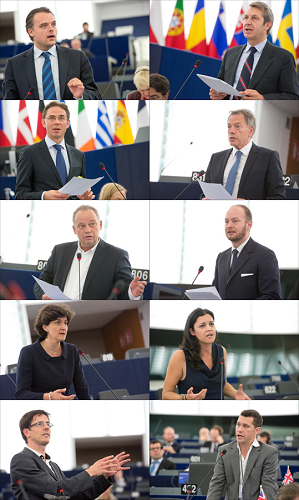European Semester: MEPs call for better implementation and more democratic scrutiny
EU countries coordinate their economic policies to create the best conditions for growth, employment and balanced budgets as part of the European Semester. However, during a debate on 21 October, MEPs stressed that recommendations should be better implemented, while the decision process should be more transparent. MEPs will vote on the report on the European Semester on Wednesday 22 October.

Top (from left): Philippe De Backer and Benedetto Della Vedova. Second row: Jyrki Katainen, Dariusz Rosati. Third row: Tibor Szanyi, Sampo Terho. Fourth row: Sylvie Goulard, Marisa Matias. Bottom row: Bas Eickhout, Steven Woolfe.
Report author Philippe De Backer, a Belgian member of the ALDE group, said that the coordination of economic policies in the EU as well as troika programmes in the bail-out countries should be subject to more democratic control by the European Parliament. Member states need to take ownership of the European Semester process to increase competitiveness, create growth and modernise their social security system and labour markets, he added.
Benedetto Della Vedova, the under-secretary of state at the Italian finance ministry, talked about the need for a long-term vision and "courageous reforms” to boost employment, growth and competitiveness.
Speaking on behalf of the European Commission, Jyrki Katainen said that the European Semester had been an extremely useful exercise in identifying and coordinating policy responses to the challenges faced by member states and the EU. "The market turbulence of last week reminded us the need to stay on the course of reforms," said the former Finnish prime minister.
Dariusz Rosati,a Polish member of the EPP group, pointed out that member states only fully implemented 10-15% of country-specific recommendations in 2013 and said the process should be more disciplined in order to mobilise sufficient political capital in favour of reforms in member states. In addition national parliaments should be more involved to improve democratic control.
Tibor Szanyi, a Hungarian member of the S&D group, warned that structural reforms can be flawed and cause poverty. As possible means to create growth, he proposed focussing on investment, fighting tax evasion and safeguarding the free movement of labour.
Sampo Terho, a Finnish member of the ECR group, was critical of any approach to European semester that was too federalist: “We cannot consider that decision making would be shifted away from the national member states at democratically elected parliaments."
Sylvie Goulard, a French member of the ALDE group, said that debates in some member states showed that a clear awareness of interdependence of economic policies in the EU was still lacking.
Marisa Matias, a Portuguese member of the GUE/NGL group, said: “Economic policies in general have been disastrous. If you really want budgetary consolidation, what you have to do is tackle a real problem we have, which is unemployment.”
According to Bas Eickhout, a Dutch member of the Greens/EFA group, the report clearly showed that there was a pro-European majority in the Parliament stressing the importance of the Semester: "This is also a very clear call to the Council and the member states to take this process more seriously."
Steven Woolfe, a UK member of the EFDD group, said the EU had failed people: “There is an average unemployment across the euro zone of 16.8% (…) We have GNP and GDP falling year on year, productivity levels lower, the highest suicide rates. Wake up and recognise: the euro is a failure.”
Source: European Parliament
- 296 reads
Human Rights
Fostering a More Humane World: The 28th Eurasian Economic Summi

Conscience, Hope, and Action: Keys to Global Peace and Sustainability

Ringing FOWPAL’s Peace Bell for the World:Nobel Peace Prize Laureates’ Visions and Actions

Protecting the World’s Cultural Diversity for a Sustainable Future

Puppet Show I International Friendship Day 2020

